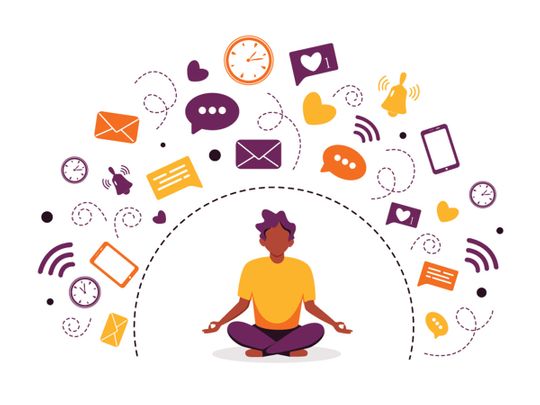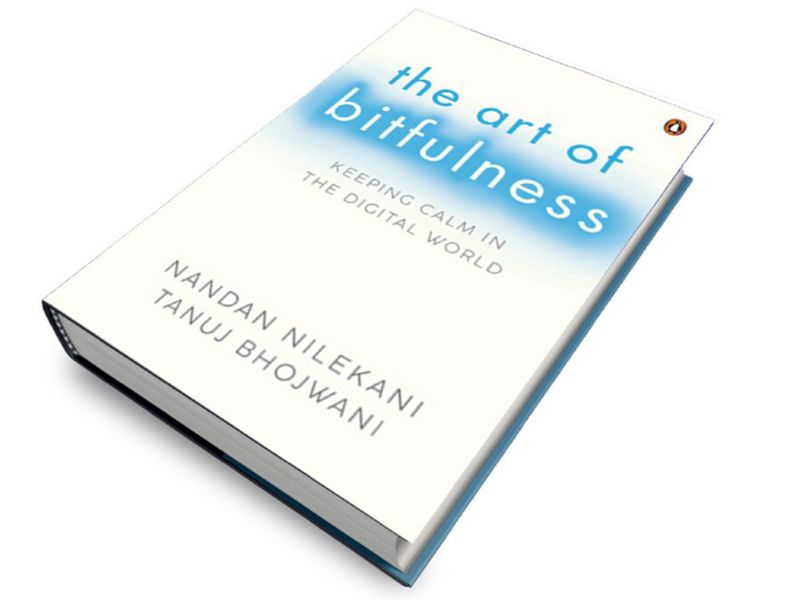
Are we, as the human species, in the midst of a crisis of distraction, confusion, anxiety, and compulsive behaviour caused by our addiction to smartphones, laptops, and other handheld devices?
Are we handcuffed day and night to gadgets in a universe which is wired, running, and on 24/7? The answers to such questions are really no-brainers–almost everyone will respond with, yes, yes, yes.
That is because each one of us instinctively reaches for their phone the first thing on waking up. Isn’t that also the last thing we also do before going to sleep? Our day begins and ends with our smartphone. It is our primary means of connecting with other people and in fact with our world itself.
How deprived and vulnerable we feel without our phones, not to speak of our tremendous data dependence on it. Our contacts, bank accounts, food, and mobility apps are all on our phones. We would be stranded and helpless without them.
What, exactly, is “bitfulness”?
As the authors of The Art of Bitfulness contend, “the average user picks up their phone about seventy-six times a day. The average user will touch, tap or swipe their phone 2617 times a day. The top 10 per cent of users in their sample were touching their phones daily more than 5427 times over about 132 different sessions.”
All this adds up to an astonishing 27,000 sessions and one million touches per year! We all know that “Our devices, all the software that runs them and the data that powers them, are an extension of our mind.”
In sickness, sorrow, danger, or distress they are our first resort and sometimes only means of succour. And yet our very dependency on such devices is also the source of constant worry, stress, anxiety, and inattentiveness.
Internet and wireless enabled appliances have literally hijacked our minds. This book is an attempt to remedy this dangerous challenge to what it means to be human. The antidote to our crisis of distractedness is “bitfulness.”
What, exactly, is “bitfulness”? If it is a term you haven’t heard before let alone frequently, please do not blame yourself. Like many smart ideas, it is a new coinage.
Its authors define it as an “awareness-driven environment design and habit change.” Not the best or most lucid of definitions, perhaps. Simply put, bitfulness refers to practices which stop internet and wireless connectivity from dominating, controlling, or destroying our lives.
Bitfulness, ultimately, is a series of conscious protocols that allow us to prevent our lives from being taken over or overrun by technology. Or if that has already happened, to take back over lives from such an enslavement or loss of autonomy.

A gadget-driven world
Finding the will and the means to regain focus and direction in the face of constant distraction and derailment is termed The Art of Bitfulness, which is also the title of this new book.
But the book is much more than what at first may appear the adaptation of traditional practices of meditation and mindfulness to the bits and bytes that make up our digitised and wired lives. The first of its three parts examines fundamental problem of our toxic relationship with technology.
The second part consists of a variety of techniques to combat and overcome it. It is actually a primer on how to stay spiritually, emotionally, and physically centred in an interconnected, tech-dominated, and gadget-driven world.
Part three extends the scope of these lessons to collective action against the “third crisis” that threatens to engulf and overwhelm humanity after climate change and global pandemics. The third crisis is fast spreading and fundamentally destabilising in ways that we have just barely begun to understand although we are all deeply affected by it.
According to the authors, “This digital crisis combines the worst aspects of humanity’s other two global crises. It is exponential in its spread like a pandemic, and its immediate convenience masks its more long-term harmful effects like the climate crisis. It may also cause economic and social damage in the long run, even as we all think our individual lives are getting better in the short run.”
In the process, we are treated to wonderful nuggets of information, caution, and common sense, ranging from “internet’s original sin” (popups) to “blitzscaling” (the business model of getting too big too soon).
What is the underlying motto of the book? It may be summed up in one sentence: “if you don’t design your technology around your life, someone else will design your life around their technology.”
The authors are especially enabled and equipped to guide us in these matters: “We have spent nearly the entirety of our careers in the space of information technology and related policy.” They add, “Despite the thirty-four-year difference in our ages, we share a sense of wonder and excitement in what information technology has achieved and continues to achieve.”

Image Credit: Supplied
Responsive to global challenges
I have deliberately refrained from naming them so far so that we are not diverted from the book’s contents. Because one of them, Nandan Nilekani, is an international legend and culture hero. The co-Founder and, currently, chairman of the board of Infosys, India’s greatest software company, he was also the moving spirit behind Unique Identification Authority of India (UIDAI).
Better known as Aadhaar, UIDAI accomplished the astonishing feat of providing something like a social security number to close to 1.4 billion Indians. Now it is the standard source of delivering benefits to the largest section of the Indian population.
Tanuj Bhojwani, Nilekani’s younger co-author, combines a flair for liberal arts and storytelling with his Chemical Engineering training from IIT-Bombay and his subsequent experience as a coder.
Together they have created a wonderfully informative, engaging, and corrective account of how survive, even thrive, in our digitally difficult environment.
To return to the title of this extraordinary book, we might discover that bitfulness is more than the art of being aware of ourselves in spite of our entanglement with technology.
It is also being responsive to global challenges and responsible for the greater common good. But in addition, it is about trying to live beautifully and blissfully in our digitally complicated and technologically enhanced world in which the very meaning of what it means to be human is rapidly and fundamentally changing.
Post Disclaimer
The information provided in our posts or blogs are for educational and informative purposes only. We do not guarantee the accuracy, completeness or suitability of the information. We do not provide financial or investment advice. Readers should always seek professional advice before making any financial or investment decisions based on the information provided in our content. We will not be held responsible for any losses, damages or consequences that may arise from relying on the information provided in our content.




